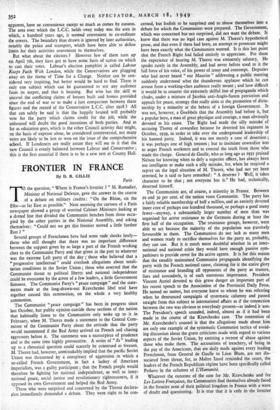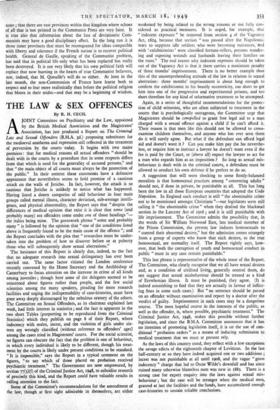FRONTIER IN FRANCE
By D. R. GILLIE Paris
TO the question, " Where is France's frontier ? " M. Ramadier, Minister of National Defence, gave the answer in the course of a debate on military credits : " On the Rhine, on the Elbe—as far East as possible." Next morning the cartoon of a Paris newspaper showed a group of worried Cabinet Ministers looking at a dotted line that divided the Communist benches from those occu- pied by the other parties in the National Assert-1131y, and asking themselves: " Could not we get this frontier moved a little further East ? "
Several groups of Frenchmen have had some rude shocks lately— those who still thought that there was no important difference between the support given by so large a part of the French working class to the Communist Party and that given in the past to whatever was the extreme Left party of the day ;- those who believed that a "progressive intellectual" could overlook allegations about totali- tarian conditions in the Soviet Union ; those who asserted that the Communist threat to political liberty and national independence _ could be overcome by the arrest of a few leaders, a little Government firmness. The Communist Party's " peace campaign " and the state- ments made at the long-drawn-out Kravchenko libel trial have together caused this commotion, on the whole a very healthy commotion.
The Communist " peace campaign " has been in progress since last October, but public opinion outside those sections of the nation that habitually listen to the Communists only woke up to it in February, when M. Thorez made a statement to the Central Com- mittee of the Communist Party about the attitude that the party would recommend if the Red Army arrived on French soil chasing aggressors before it. The statement was a masterpiece of prudence and at the same time highly provocative. A series of " ifs " leading up to a rhetorical question could scarcely be construed as -treason. M. Thorez had, however, unmistakably implied that the pacific Soviet Union was threatened by a conspiracy of aggression in which a so-called French Government, in fact a lackey of American imperialists, was a guilty participant ; that the French people would therefore be fighting for national independence, as well as inter- national peace, social justice and revolutionary righteousness, if it opposed its own Government and helped the Red Army.
Those who were surprised and concerned by the Thorez declara- ;ion immediately demanded a debate. They were right to be con-
cerned, but foolish to be surprised and to throw themselves into a debate for which the Communists were prepared. The Government, which was concerned but not surprised, did not want the debate. It knew that there was no legal case against M. Thorez's hypothetical prose, and that even if there had been, an attempt to prosecute might have been exactly what the Communists wanted. It is this last point that the French Right had failed entirely to appreciate. For them the experience of hearing M. Thorez was eminently salutary. He speaks rarely in the Assembly, and had never before used to it the full force of his voice, of his power of irony and contempt. Deputies who had never heard " our Maurice " addressing a public meeting suddenly understood what the thunderous applause which he can arouse from a working-class audience really meant ; and how difficult it would be to counter the extremely skilful line of propaganda which cloaks, under a mixture of Jacobin anti-Anglo-Saxon patriotism and appeals for peace, strategy that really aims at the promotion of dicta- torship by a minority at the behest of a foreign Government. It was not, however, a Goebbels that the Assembly had before it, but a popular hero, a man of great physique and courage, a man obviously devoted to his cause. The Right had made the silly mistake of accusing Thorez of cowardice because he deserted his regiment in October, 1939, in order to take over the underground leadership of his banned party. Indeed, it was not merely a case of desertion ; it was perhaps one of high treason ; but to insinuate cowardice was to anger French workmen and to conceal the truth from those who made the charge. General de Gaulle, who as long ago as 1931 praised Nelson for knowing when to defy a superior officer, has always been too intelligent to make such a silly mistake, for, when he received a report on the legal situation of M. Thorez, who had not yet been arrested, he is said to have remarked : " A deserter ‘? Well, it takes character to be that ; not everyone has it." He had, technically, deserted himself.
The Communists are, of course, a minority in France. Between zo and 3o per cent. of the nation votes Communist. The party has a fairly reliable membership of half a million, and an entirely devoted inner core of perhaps one hundred thousand, or perhaps a good many fewer—anyway, a substantially larger number of men than was organised for active resistance to the Germans during at least the first half of the occupation. The resistance groups, however, were able to act because the majority of the population was 'passively favourable to them. The Communists do not lack as many men and women ready to sacrifice themselves for the party as, probably, they can use. But it is much more doubtful whether in an inter- national and national crisis they would have enough passive sym- pathisers to provide cover for the active agents. It is for this reason that the steadily maintained Communist propaganda identifying the party with the French national cause, claiming for it the entire glory of resistance and branding all opponents of the party as traitors, liars and scoundrels, is of such enormous importance. President Vincent Auriol devoted to this grave danger an important part of his recent speech to the Association of the Provincial Daily Press. He named no names, but everyone knew to whom he was referring when he denounced campaigns of systematic calumny and passed straight from this subject to international affairs as if the connection between the two was obvious to everybody present—as indeed it was. The President's speech sounded, indeed, almost as if it had been made in the course of the Kravchenko case. The contention of Mr. Kravchenko's counsel is that the allegations made about him are only one example of the systematic Communist tactics of avoid- ing discussion about the grave criticisms made with regard to various aspects of the Soviet Union, by emitting a torrent of abuse against those who make them. The accusations of treachery, of being in the pay of the Americans, that are daily made against every leading Frenchman, from General de Gaulle to Leon Blum, are not dis- sociated from threat, for, as Maitre Izard reminded the court, the leaders of the French Republican regime have been specifically called Petkovs in the columns of L'Humanite.
Whatever the outcome of the case for Mr. Kravchenko and for Les Lettres Francaises, the Communists find themselves already faced in the frontier zone of their political kingdom in France with a wave of doubt and questioning. It is true that it is only in the frontier
zone ; that there are vast provinces within that kingdom where echoes of all that.is not printed in the Communist Press are very faint. It is true also that information about the fate of deviationist Com- munists may have a good disciplinary effect. In the long run it is those inner provinces that must be reconquered for ideas compatible with liberty and tolerance if the French nation is to recover political health. General de Gaulle, speaking of the Communist problem, has said that in political life only what has been replaced has really been destroyed. It is not very likely that his own political faith will replace that now burning in the hearts of true Communist believers, nor, indeed, that M. Queuille's will do so either. At least in the last month, the non-Communists of France have learnt both to respect and to fear more realistically than before the political religion that blazes in their midst—and that may be a beginning of wisdom.







































 Previous page
Previous page